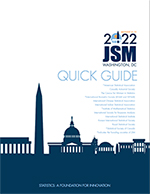Back
2022 Joint Statistical Meetings
Government Statistics Section
Session: Contributed Poster Presentations: Government Statistics Section
Adaptive Sampling for Social Surveys at Statistics Flanders
Tuesday, August 9, 2022
Activity Number: 287
-
Luca Carlini
IRCCS Istituto Giannina Gaslini
In a crisis like the Covid-19 pandemic, new information is needed faster. Therefore, Statistics Flanders (Belgium) redesigns its social survey including plans to switch from simple random sampling to recurrent two-phase sampling: a master sample is selected from the National register and subsequently a stratified subsample is extracted for each new survey.
We present the comparison of 3 alternative adaptive sampling methods with permanent random numbers for the subsampling phase (TSA: two step approach; ASP: sequential procedure; AGSP: group sequential procedure). In TSA, a pilot sample is extracted to estimate strata variances for selecting the remaining part of the sample according to optimal allocation. In ASP the size of the pilot sample can be smaller than in TSA, since one unit is selected at a time and strata variances are continuously updated. Finally, in AGSP a group of units is selected at each step.
We made use of the data of an existing survey (Statistics Flanders, ISSP 2016) for simulating the master sample and comparing the performance of the 3 methods. AGSP allowed reaching the prefixed estimator variance with the smallest sample size, saving both time and money.
We present the comparison of 3 alternative adaptive sampling methods with permanent random numbers for the subsampling phase (TSA: two step approach; ASP: sequential procedure; AGSP: group sequential procedure). In TSA, a pilot sample is extracted to estimate strata variances for selecting the remaining part of the sample according to optimal allocation. In ASP the size of the pilot sample can be smaller than in TSA, since one unit is selected at a time and strata variances are continuously updated. Finally, in AGSP a group of units is selected at each step.
We made use of the data of an existing survey (Statistics Flanders, ISSP 2016) for simulating the master sample and comparing the performance of the 3 methods. AGSP allowed reaching the prefixed estimator variance with the smallest sample size, saving both time and money.

